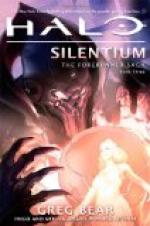Lady Kingsmead burst into tears and hurried from the room, but Brigit wrote a telegram, as dictated by the old doctor who had brought the boy into the world, to a famous physician in London, and a groom was sent galloping to the station to send it.
“Who is this person he always takes me for?” asked the doctor, polishing his glasses. “This morning he insisted on my—on my playing for him. I have never played anything except the cornet, when I was a young man. I—it very nearly upset me, Lady Brigit. I love Tommy.”
Brigit flushed. “Wanted you to play the violin?” she returned.
“Yes. He has not done so until this morning for several days, but he quite insisted to-day.”
“It must be—Joyselle. We—we know him very well, and Tommy adores him.”
As she spoke the nurse came in.
“Would you mind coming, my lady? He is very restless and insists on trying to play. I can’t quiet him at all——”
They went back into the sick-room and found Tommy sitting up in bed, holding his violin in the position for playing, and scolding in a sharp staccato voice because he couldn’t find his bow.
“Tommy, dear,” Brigit said quietly, suddenly seeing her way clear, “I am wiring the Master to come to see you. He will play for you. Now give me your violin and lie down like a good boy.”
Under the impression that she was Mrs. Champion, the housekeeper, but perfectly satisfied with her words, he gave up the fiddle obediently and lay down. The doctor nodded his approval and left a few moments later to send the telegram to Joyselle. And Brigit sat down by the bed and waited.
CHAPTER ELEVEN
The weather had changed suddenly, and although it was only the 14th of September, it was cold and cheerless that afternoon.
Brigit, who had been sent out for a walk, tramped steadily down the road towards the village, her hands in her jacket pockets, her chin buried in her little boa.
Tommy was very ill; the London doctor had confirmed old Dr. Long’s opinion: an over-developed mind in an under-developed body. These words in themselves were not very alarming, but Brigit’s heart had sunk as Sir George uttered them.
“Is he—is he going to die?” she asked abruptly. Sir George hesitated. “We scientists are supposed to be atheists, my dear young lady,” he returned, looking at his watch, “but I believe in God. And in all reverence I can say in this case that only He can tell. Lord Kingsmead is very weak, and I greatly dislike the abnormal activity of his brain, but—God is good. So let us hope.”
Then the great man had gone.
By the 5.10 express Joyselle was coming. He had been out of town the day before, and the delay had been maddening. But now he was coming, and Brigit pinned her faith to the effects of his presence with savage fanaticism.




